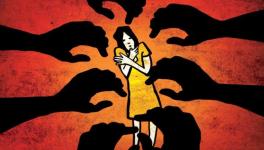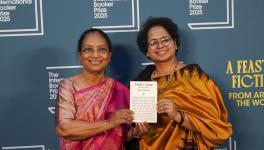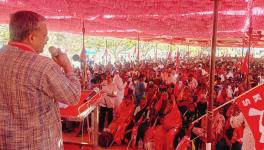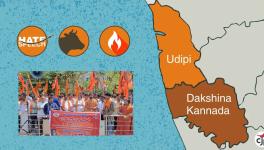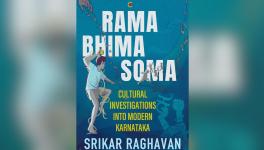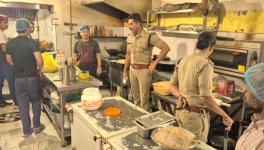Right to Food: Civil Society Condemns Targeting of Meat Sale and Consumption
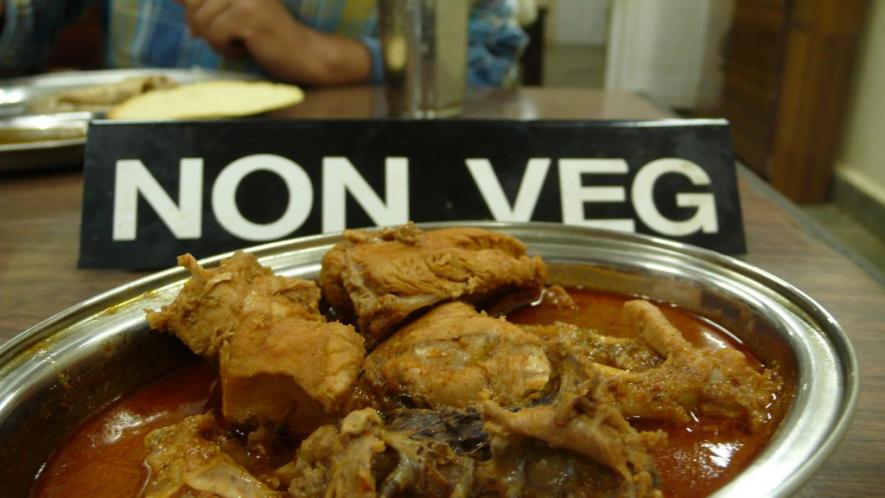
Representational image. | Image Courtesy: Flickr
A group of concerned citizens and civil society organisations in a statement have expressed grave worries over bans on and boycott on sale and consumption of meat and eggs around the country. They have condemned such moves as violation of the right to food and nutrition.
Saying that India’s nutrition policies were not based on science but the “fragile sensibility of the ‘vegetarian’”, the groups in their statement condemned the “food intolerance” being created in the country.
The statement noted that in majority of the Bharatiya Janata Party-ruled states, eggs were eliminated from mid-day meals and Anganwadis, putting children from socio-economically backward communities at an increased risk of malnutrition.
The statement also criticised the current volatile situation in Karnataka. It said a Hindu right-wing group has campaigned in Karnataka since March this year against the purchase of Halal meat, and fuelled the growing communal tensions in the state. Moreover, it said the Karnataka Prevention of Slaughter and Preservation of Cattle Act, 2020 has brought farmers, cattle traders, butchers, leather industry workers, and such other groups to the brink of economic destitution.
Among the organisations who brought out the statement are Ahara Namma Hakku, Bahutva Karnataka, Campaign Against Hate Speech (CAHS), MILANA, Karnataka, and Secretariat Right to Food Campaign. Besides, 102 concerned citizens also signed the statement.
Read the full statement below:
Ahara Namma Hakku/Our food, our right
Targeting the consumption and sale of meat in India is an attack on the right to food and nutrition
As a group of concerned activists, doctors, nutritionists, parents, advocates and researchers, we are deeply concerned at the recent irrational attacks on the food habits and nutrition rights of poor people, in the form of laws, bans and calls to boycott the sale and consumption of meat. While these bans and calls to boycott meat have been isolated incidents as of now, this culture of interfering in people’s choice of food and livelihood may have serious social, economic and nutritional consequences if not countered.
India’s nutrition statistics
The statistics on nutrition in India are abysmal. According to the Comprehensive National Nutrition Survey (CNNS) 2016-18 data, among children aged 6 to 23 months, only 42% were fed the minimum number of times per day for their age, 21% were fed an adequately diverse diet containing four or more food groups, and just 6.4% received a minimum acceptable diet.
Among children aged 2 to 4 years, while 96% consumed grains, roots and tubers and 62% consumed dairy products, only 5% consumed vitamin A-rich fruits and vegetables the previous day, 16% had consumed eggs, and 1% had consumed flesh foods. Among adolescents, only 35% consumed eggs, and 36% consumed fish, chicken or meat.
Also as per CNNS, 35% of Indian children aged 0-4 years are stunted and 33% are underweight, with higher figures (around 40%) for states like Bihar, Jharkhand, Madhya Pradesh and Uttar Pradesh. Children in the poorest wealth quintile are far more likely to be stunted (49%), compared with those in the richest quintile (19%), and about twice as likely to be underweight. Similarly, children from the scheduled tribes have high rates of underweight (42%) compared with scheduled castes (36%), other backward classes (33%), and other groups (27%).
Anemia is at least a mild public health problem for school-age children 5–9 years in all states except for Kerala, and a moderate or severe public health problem among preschoolers in 27 states. Anemia in children can lead to impaired cognitive development, poor physical growth, increased morbidity and decreased work productivity in adulthood (FAO/WHO, 2005).
Iron, vitamin A, iodine, zinc, folate, vitamin B12 and vitamin D are generally considered essential in childhood and adolescence, but there is high deficiency of all these nutrients among Indian children. Vitamin A deficiency, for instance, is estimated at 18% for pre-school children aged 1–4 years, 22% among school-age children aged 5–9 years and 16% among adolescents aged 10–19 years. Vitamin D, essential for bone health, was found deficient in 14%, 18% and 24% of these respective age groups. Zinc deficiency, associated with growth retardation, loss of appetite and impaired immune function, affects 19%, 17% and 32% respectively.
Need for food diversity and animal source foods
Food diversity and adequate quantities of animal source foods (ASF) are an excellent way of addressing nutritional deficiencies. Evidence shows that an important way of preventing nutritional deficiencies is to ensure adequate quantities of diverse foods that include, apart from cereals and millets, recommended quantities of legumes,
pulses, nuts, eggs, meat, milk/dairy, fish, poultry, vegetables, fats and oils as well as other green leafy vegetables.
UNICEF has recently released a child nutrition report 2021 from 135 countries where they recommend diverse foods/animal source foods/vegetable and fruits/breastmilk etc. When a majority of the population is undernourished, it is expected that they will also have multiple nutrient deficiencies. Just because one or two deficiencies become clinically obvious doesn’t mean that only those nutrients should be provided. People need diversity by inclusion of different food groups – namely vegetables and fruits, cereals and millets, legumes and pulses, meat, fish and poultry, eggs, milk and dairy products as well as fats and oils.
For micronutrient deficiencies (iron, zinc, Vitamin A, B12, Folate and calcium) the most nutrient dense foods based on what is available regionally include chicken liver, ruminant liver, small fish (also source of Vitamin D and long chain omega 3 fats), eggs, ruminant meat, dark leafy greens. The CNNS report specifically mentions that iron rich food includes “any liver, kidney, heart or other organ meat; any chicken, duck, or other poultry; any fresh or dried fish or shellfish; or any other meat”.
According to a recent Food and Agriculture Organisation (FAO) report, South Asia has the lowest per capita availability of meat (19g/day) and India is the lowest in any country (10g/day). The report recommends that campaigns should encourage increased consumption of chicken liver, ruminant liver, ruminant meat for children 6-23 months. It also says that green leafy vegetables are moderately available, that fish is consumed only in certain areas, and that the consumption and production of eggs should be increased.
Contrary to the common characterisation of India as a vegetarian country, it has a rich tradition of meat diets and culinary practices. Only 20% Indians self-identify as vegetarians and this includes ASF such as milk and dairy. Even eating beef is the
cultural practice of a significant number of Indians (at least 15% or about 180 million people), including most Dalits, Adivasis, Muslims, Christians as well as some Other Backward Classes (OBCs). Beef is one of the cheapest nutrient dense foods: 100 gm of lean beef provides 54% of the daily protein requirement, and the nutrients are digestible and well absorbed. It is another matter that most people are unable to afford meat or other animal source foods most of the time. Fortification of cereals, as currently being pushed by the Government as a panacea for malnutrition, has not been scientifically proven to be of value, especially when research shows that this can actually be detrimental in some circumstances and in some populations.
Targeting meat eaters and meat sellers
While research shows that consuming animal source foods is an important means of addressing India’s glaring nutritional deficiencies, the current government at the centre, its right-wing foot soldier brigade, its media mouth pieces, complicit judiciary and police have gone on a spree of ousting all animal source foods other than dairy from the plates of the average Indian. This can have far-reaching, often irreversible adverse outcomes.
Calls to ban meat shops are spreading across the country. On April 1st 2022 a demand was made to close all meat shops for nine days during Navaratri in UP, with those refusing to comply being threatened to have their shops bulldozed !! There have been earlier instances of targeting of meat shops in UP, starting from the first day of Yogi Adityanath’s BJP government, and also in other states such as Jharkhand and Karnataka, but the harassment has dramatically intensified in recent weeks.
Association of meat with dirt, disease and poor sanitation is deeply ingrained and captures the imagination of the “pollution hating” privileged classes and castes. This sentiment means that lynching, mob violence, vandalising shops, abusing shop owners, are all seen as part of a sanitation or cleanliness drive!!
Organisations such as Akshaya Patra which is the affiliate of the International Society for Krishna Consciousness (ISKCON) publicly promote sattvic foods which necessarily reject all forms of meat, poultry and even eggs. The organisation even refuses to use onion and garlic in the government funded school mid-day meals, flouting government norms. This unscientific and nutritionally inadequate food is then imposed on children as somehow elevating them to higher states of existence.
According to the existing scientific literature, the most likely outcome of these restrictions is that children will be pushed further into malnutrition. But this does not seem to matter as long as they are “pure”!!
Demand for meat bans have been heard recently in Gujarat, Uttar Pradesh, Delhi and also Karnataka where, going a step further, a demand has emerged for a boycott/ban on halal meat. Meat bans take a toll on vulnerable communities (especially Muslims and Dalits) but this seems to be of no consequence to elected representatives who have convinced themselves that they cater to a narrow religious or caste group. The agenda of a communal state and central government seems to be to target Muslim communities more than any real sentiments around meat.
Calls for bans and boycotts affect many communities that are already on the economic brink. Stringent cattle slaughter bans in several states have turned a legitimate trade that sustained the livelihood of thousands into an illegal activity, making these groups vulnerable to police heavy-handedness, legal quagmires, economic destitution and the inevitable self-appointed “gau-rakshaks” who are nothing more than goondas indulging in violent anti-social activities. Cattle slaughter bans have adversely affected all those who depend on the cattle trade (starting with the farmers and extending to cattle traders, butchers, vendors and consumers) and dealt a debilitating blow to the livestock, leather and meat economy. Livestock and agriculture are closely linked and crucial for overall food/economic security of many people along the upstream and downstream chains. Farmers rear
cattle for milk, manure, transportation and draught purposes, and replace them when these become unproductive. There is also a very large trade of meat, offal, hooves, skin, bones, blood, tallow and other products from “unproductive cattle”.
Most of the people engaged in the most menial of occupations within the livestock sector belong to the Dalit community and have been direly hit by cattle slaughter bans. Instead of investing in infrastructure and machinery to modernise this trade so that the Dalit community can be economically uplifted, it is a form of caste discrimination that even existing sustenance livelihoods are being taken away.
Food Fascism in Karnataka
Recent events in Karnataka have taken this harassment to new heights. It comes at a time when Muslims across Karnataka have been at the receiving end of various bans called for by right-wing groups, adding to the growing polarisation in the southern state under the Basavaraj Bommai-led Bharatiya Janata Party (BJP) government.
Since March 2022, there have been campaigns by a Hindu right-wing group in Karnataka against the purchase of Halal meat, fuelling the already growing communal tensions in the southern state. The same group held a meeting with officials of the Karnataka endowments department earlier this month and submitted a memorandum demanding that non-Hindus should not be allowed to set up shops near temples that come under the department. Residents of districts like Chikmagaluru, Dakshina Kannada and even Bengaluru witnessed communally charged incidents as right-wing groups continue to impose restrictions on Muslim traders, adding to tensions in the state.
The Karnataka Prevention of Slaughter and Preservation of Cattle Act, 2020 has brought farmers, cattle traders, butchers, those working on the leather industry, curing etc. to the brink of economic destitution. In their Public Interest Litigation (PIL) filed at the High Court of Karnataka, the Dalit Sangharsha Samithi
(Bheemavaada) states that the Karnataka Prevention of Slaughter and Preservation of Cattle Act, 2020 Executive 2020 Act violates the fundamental rights of the citizens of India, particularly of the Dalit and minority communities under Articles 14, 19 and 21 of the Constitution. The adverse consequences of this Act are extensively documented in a recent report prepared by Ahara Namma Hakku. Most livestock is owned by landless, marginal and small holding farmers and they depend heavily on this for their income. A drop in milk production is not only a threat to the farmers’ income but also a threat to nutritional security of the state.
The Battle for Eggs
Although the politics around beef and even meat is well known, eggs have been denied in midday meals and Anganwadis in 14 out of 19 BJP majority states aside from a few other states. In many of these states (e.g. Chhattisgarh, Karnataka and Madhya Pradesh), persistent demands for introducing eggs in midday meals have been vociferously resisted by privileged or upper-caste vegetarian minorities. In Madhya Pradesh, their opposition did not even allow eggs to be served in three Adivasi-dominated districts on a pilot basis.
Recently, the government of Karnataka broke this jinx with a welcome albeit thoroughly inadequate decision (in November 2021) to introduce eggs in midday meals, a long pending demand from children, parents, nutritionists, doctors and activists – but only in seven districts. Objections have been raised by religious groups who had prevented a similar attempt in 2015, their argument being that “traditional eating practices” should not be tampered with and that the “imposition” of eggs on “vegetarian” children, when there are vegetarian alternatives, is discriminatory. This argument is ridiculous on several counts.
Eggs can improve the nutritional status of the child and help the child gain essential nutrients to fight infection and get out of the vicious cycle. This is also why eggs should be given to all children who traditionally consume them, irrespective of whether they are currently malnourished or not, because their risk of going into malnutrition is more, given their social and economic location. In this instance, prevention of malnutrition and consequent ill health is better public health practice than looking at abysmal nutritional indicators and taking remedial steps. Eggs provide many of the nutritional needs of children, including good quality proteins, minerals, vitamins and fats. They are tasty, affordable, simple to cook, and less vulnerable to adulteration and pilferage than other nutritious foods. They also increase school attendance. The continued exclusion of eggs from midday meals in many states is a grave injustice towards Indian children, which reflects a caste bias more than anything else.
Condemning the food intolerance being created in India
Tragically, India's nutrition policies have always been embroiled in anything but science and the stark consequences are visible to anyone who cares to look at the country’s health and nutrition indicators.
For several years, the fragile sensibility of the “vegetarian” has been the clinching factor for policy decisions. Institutional hostels, government offices, schools, colleges, public institutions, office spaces, media houses, aircraft, trains etc. are forever tiptoeing around the sensibilities of this minuscule “vegetarian” citizenry who will get offended at the drop of an egg. The consequence of this is a loss of and criminalisation of the rich and diverse eating traditions of the majority population. The nutritional benefits of meat, eggs, poultry, fish are being kept aside in spite of anaemia, Vitamin A/B12/zinc/calcium/Vitamin D/iron etc deficiencies pushing the country to major ill-health and nutritional crisis.
In the case of Shaik Zahid Mukhtar v State of Maharashtra & Ors 2016, the Bombay High Court clearly stated that “if the State tells the citizens not to eat a particular type of food or prevents the citizens from possessing and consuming a particular type of food, it will certainly be an infringement of a right to privacy as it violates the right to be let alone.”
The politics around beef by the current BJP governments at the Centre and State levels should be viewed in the larger context of targeting minorities economically, socially and politically. The Covid pandemic which led to large scale loss of employment and incomes, specifically saw livelihoods of Muslim businesses, both small and large, being targeted. The cattle slaughter ban is perceived by many as a concerted effort by a right-wing government to bring the Muslim community to economic destitution.
India has had an uneasy relationship with Animal Source Foods (ASF) for a long time. These ASF have been overtly and covertly given a similarly hierarchical status as humans within the pervasive caste system in the country. While ASF such as milk and dairy are accorded a venerable status, at the other end of the spectrum are the red meats, specifically beef, for the possession of which one can be lynched. All the other meats such as fish, poultry, eggs etc. fall somewhere along the spectrum.
Although seemingly unrelated, it is important for the link to be made between the large-scale targeting of all ASF, other than milk/dairy, and denying both livelihood and nutrition to those who trade with or consume these foods.
Needless to say, vegetarians deserve (and demand) respect for their food preferences. However there needs to be a cognisance that the vegetarianism of the rich, with its diverse intake of nuts, milk, dairy, ghee, butter, pulses, vegetables etc. is very different from the cheap cereal/millet dominated vegetarianism that is being imposed on the poor. The fragilities and sensibilities of the 20% “vegetarian” should neither be the premise for making decisions about the rest, nor should science and evidence take a back-seat to propaganda, ideology and sheer brute force.
This is the Kannada translation of the letter
Report on the adverse effects of the cattle slaughter ban
Endorsed by:
Organisations
- Ahara Namma Hakku
- Bahutva Karnataka
- Campaign Against Hate Speech (CAHS)
- MILANA, Karnataka
- Secretariat Right to Food Campaign
Individuals
-
- Akhil Mythri , National Institute of Advanced Studies
- Alwyn D'Souza, Concerned citizen
- Amita Pitre, Independent Researcher and Development Practitioner.
- Ammu Joseph, Concerned citizen
- Anita Cheria, OpenSpace
- Ashiq Ahamed Chemmalasseri, Concerned individual
- Ashok Maridas, Grass root Consultants
- Avani Chokshi, All India Lawyers' Association for Justice
- Beena Pallical, Human rights Activist
- Bela Bhatia, Human-rights lawyer
- Bindhulakshmi Pattadath, Concerned individual
- Brinda Adige, Global Concerns India
- D Parthasarathy, IIT Bombay, Nutrition Researcher
- Deshdeep Dhankhar , University of Hyderabad
-
- Dheeraj S.P, Concerned citizen
- Diana Rodgers, RD, Executive Director, Global Food Justice Alliance
- Dipa Sinha, Concerned citizen
- Divya Prafulla , Concerned citizen
- Divya Reshma, Center for Rural Development
- Dr Anoob Razak, Public Health Practitioner
- Dr Bharatashree VM, Human rights defenders Association
- Dr Numan Mallick, Medical doctor
- Dr Salamah Parveen Imteyaz, Activist
- Dr Samantha Spence, Senior Lecturer in Law
- Dr. Amar Jesani, Independent Researcher and teacher (Public Health & Bioethics)
- Dr. Sana Contractor, Independent Researcher
- Dr. Shakeel, Indian Doctors for Peace and Development
- Dr. Sylvia Karpagam, Public health doctor
- Dulcine Crasta, Social Worker
- Elizabeth Kuriakose, Concerned citizen
- Evelyn Crasta, Concerned citizen
- Faeza Zainab, Concerned citizen
- Firdouse Khan, Forward Trust
- Fr Jothi SJ Kolkata
- Frédéric Leroy, Professor in food science
- Gloria Maria Crasta, Activist, Karnataka
- Guneet Malik, Analytics and public policy professional
- Gurumurthy Kasinathan, Educationalist
- Himakiran Anugula, Concerned citizen
- Inayat Singh Kakar, Jan Swasthya Abhiyan
- Irene Crasta, Roshni trust
- Jacinta Kerketta, Writer
- Jacintha Lasrado, Concerned citizen
-
- Jamila Koshy, Concerned citizen
- Janaki Nair, Prof. (Retd) Centre for Historical Studies JNU
- Janet Pinto, Roshni trust
- Jashbhai Prajapati, Retired Dean, Dairy Science
- Jean Dreze, Concerned citizen
- Jerald D'souza, Advocate
- Jerald M DSouza, Concerned citizen
- JN Rao, Visiting Professor of Public Health, Staffordhsire University
- Josmita, Concerned citizen
- Kamayani Bali Mahabal, Jan Swasthya Abhiyan ,Mumbai
- Kavya, Concerned individual
- Latha Jayaram, Concerned individual
- Leena dsouza ಸ್ಪೂತಿ Sadan
- Mabel Pinto, Concerned citizen
- Maitreyi Krishnan, Advocate
- Marcia DCunha, National Secretary ICWM
- Mary Nirmala , Roshni trust
- Mohammed Mehaboobe Subhani, Concerned individual
- Mohita, Concerned individual
- Mukhtar, Concerned citizen
- Nachiket Udupa, Concerned individual
- Nalin Goel, Concerned citizen
- Nebu George, IIT Bombay
- Nivedita Saksena, Concerned individual
- Oliva Saldana, Concerned individual
- Prabir KC- Independent Community Health practitioner
- Pradeep E, Concerned citizen
- Prasujith P K, Concerned citizen
- Prof. Mohan Rao, Independent Public Health researcher
- R. Selvan, Activist
-
- Rajashri Dasgupta, Journalist
- Ravi Duggal , Independent Public Health Researcher and Activist
- Rohini Bhola, Concerned citizen
- Rosamma Thomas, freelance journalist
- Rummana khanam, Activist
- S Subramanian, Independent scholar, Chennai
- Samira Nadkarni, Concerned individual
- Satyaprasad , Concerned citizen
- Sayantan Datta, Activist
- Shanthi Dsouza, Concerned citizen
- Sharda Ugra, Concerned citizen
- Sharon Rajkumar, Independent
- Shashank SR, Research Scholar
- Sheba George, Social Worker
- Shobha lobo, Activist
- Siddharth K J, Independent Researcher, Bengaluru
- Siddhesh Pathre, Concerned individual
- Soumyadeep Bhaumik, Concerned Medical Doctor and International Public Health specialist
- Sr. Santhosh Mary, JMJ
- Stephen Corry, Food rights activist
- Sudha N, Researcher & Activist
- Sushil Khanna, Professor
- Swamy S, Activist
- Syed Tousif Masood, Bahutva Karnataka
- Teyol Machado, Center For Non Formal Education, Bijapur
- Valentine Dsouza , Concerned citizen
- Veena Ravikumar, Concerned citizen
- Vikram Kaushik , VKSA
- Virginia Saldanha, Indian Christian Women's Movement
Get the latest reports & analysis with people's perspective on Protests, movements & deep analytical videos, discussions of the current affairs in your Telegram app. Subscribe to NewsClick's Telegram channel & get Real-Time updates on stories, as they get published on our website.










